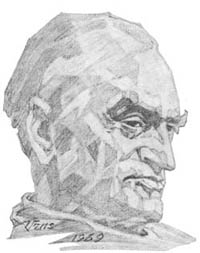Editors of this issue: Antanas Klimas, Kestutis Skrupskelis

|
LITUANUS
LITHUANIAN QUARTERLY JOURNAL OF ARTS AND SCIENCES
Volume 15, No.1 - Spring 1969
Editors of this issue: Antanas Klimas, Kestutis Skrupskelis Copyright © 1969 LITUANUS Foundation, Inc.
|

|

PROF. V. MYKOLAITIS-PUTINAS,
famous Lithuanian writer and poet
1-6-1893 — 6-7-1967
V. Mykolaitis-Putinas
MORTUOS VOCO*
Translated by Raphael Sealey
Now I depart. With benedictory grace
A world of silence summons me to go,
I feel the gentle shroud of endless space,
The Night that soothes and softens all our woe.
A boundless liberty, a perfect rest
Opens to greet the long-awaited guest.
The dusk of twilight falls. I go
To join my folk, to join my kin.
Yet still I see the west aglow
And hear in distant towers a din
That calls me back. Sorrow and pain
Suffuse my breast with gall and spite.
Dusk falls but daylight's grieves remain.
In angry heat my heart has bled;
It has not learnt to worship might.
I call the dead.
I summon every skeleton that lies
In grave-yard hill or valley, sand or clay,
Corpses in ditches, pits beside the way,
And some in dug and tended graves; arise!
Come, legions of the venerable ground,
All you who fell beneath a torturer's blow,
You who in winter's starving desert found
Death's solace in the symphony of snow;
The countless men who chose to fight and stand
For the freedom of our land.
The executioners tore your limbs,
They gloried in your groans and sighs;
Your agony pleased their drunken whims.
While torches glistened bright and red,
They tramped your graves with dancing tread.
Disfigured and disgraced, arise!
I CALL THE DEAD
But silence shrouds the grave-yard on the hill.
No corpse stirs from its damp and earthly cell.
Bare skulls of sleeping skeletons are still,
And what they dream, no mortal mind can tell,
As none can read the riddle of the pain
They knew, its origin, its cosmic goal,
But like this Night of silence and of bane
An endless secret hides their eternal role.
Still driven by an everlasting goad
The living limp towards this place of fear.
For every man must tread the selfsame road,
And now my time is near.
Into the Night of dread I pass
And leave for ever sun and day.
But from the sod of weeds and grass
Someone may stretch his hand and say:
"Be my companion. We seek the place
Where no one laughs, no tears are shed,
The silent sanctuary of space."
I call the dead.
So I depart. So I accept the blessing
Of a world of silence summoning me to go.
I mount the lofty bridge and onward pressing
Discern a scented Night of warmth, where slow
The stars in countless legions go their ways.
Beyond the narrow bridge's awesome height
My course turns sharply. Far ahead I gaze
And see my path in rays of brilliant light.
The motherly embrace of Night
Receives the wanderer, soothes his fears,
And pitying his weary plight
Gives sustenance and dries his tears.
Long did I travel, long did I roam
On roads the burning sun had tiled
With heat and stones of ruthlessness.
Now worn and tired. I come home,
And Night says: "Stay with me, my child,
For I know your distress."
And so I stay. I dragged all day
A heavy load of life and dread,
Till like ripe fruit it fell away.
I call the dead.
According to an old belief, church-bells say: "Vivos voco, mortuos plango" (I call the living, I lament the dead). V. Mykolaitis-Putinas wrote the poem with the title "Vivos plango, mortuos voco" (I lament the living, I call the dead). The second part of the poem is given below.